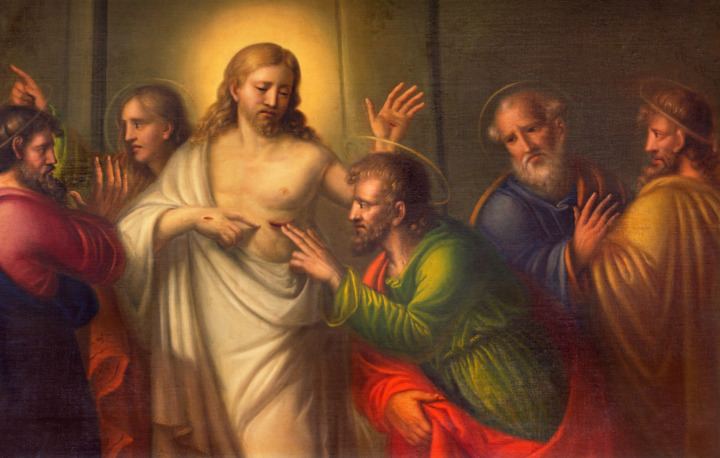(前記事より続く)
神への信頼から不安を乗り越えていく
[toggle]When this ever-present God asks us to be bold and courageous, we find a surprising paradigm for dealing with anxiety. The life of faith is difficult and requires trusting in God beyond what the eye can see. But a life of unbelief is even more difficult because it capitulates to fear and loses sight of God in the ensuing panic.Either way, this isn’t the proverbial case of doubt crowding out faith. Doubt is a tool for questioning one’s fears. It is anxiety itself that undermines faith. Our vocation as anxious believers is to see and appreciate the contradiction between our anxiety and the God who loves us. With the help of other techniques, and possibly medication, we battle anxiety simply by believing God.
This challenge has been impactful for me personally. I am very good at controlling my life. I can anticipate demands, manage projects, and persevere. I plan my days to the hour (sometimes even more detailed than that), and I work with others, whether my wife or a coworker, to make sure I’m covering my responsibilities at home and at work. But in my darkest moments, especially when I’m tired, I get anxious about things I can never control. I fret about plane crashes, cancer—even about interactions with strangers.
If left unchecked, these thoughts become the background noise of my life. So there is grace in being told that my anxiety is creating illusions, or in the words of Martin Luther—a theologian who struggled with anxiety unlike any other—anxiety is all that Satan can do to us now, for the Lord is “a fortified tower; the righteous run to it and are safe” (Prov. 18:10). [/toggle]
この「常に存在する神」が勇気をもって恐れを退けるものになるよう私たちに語る時、そこには驚くべき不安への対処法が見えてくる。つまり信仰生活が困難なものであっても、私たちに求められているのは目に見えないもの(恐怖)を乗り超えて神を信頼すること、ということだ。しかし、人生に信仰がなければ私たちは恐怖に膝を付き、パニックに襲われるあまり神を見失ってしまう。
いずれにせよ、これは信仰を惑わせるための言葉ではない。疑いとは自分の恐れがどこから来るものなのかを知るためのバロメーターだ。信仰を損なわせるのは不安そのもの。不安を抱える私たちがするべきは、不安に駆られる私たちをも愛してくださる、どこか矛盾した神様が居てくださることに感謝することだろう。様々なテクニックや薬物療法を利用することもあるだろうが、私たちはただ神を信じることで、この不安感に抗うことが出来る。
この課題は私にとっては大きな変化をもたらすものだった。私は自分の人生をコントロールすることを得意としており、自分には何が要求されているのかを予測し、プロジェクトを管理し、忍耐することも苦ではない。私は毎日の計画を時間や分単位で立て、妻や同僚と協力して、自宅と職場での責任を確実にこなすことが出来る。しかし暗闇を歩く時、特に疲れているとき、私は「飛行機の墜落」や「病気」、時には「他人とのやりとり」など、自力ではコントロールできない事柄を不安に感じてしまう。
気を付けないと、こういった心配事は私たちの人生を不安定にさせる。
だからこそ「あなたが幻想を抱くのは不安だからです」と言われたとき、私は救われたような気持になった。誰よりも不安感に苦労した神学者マルティン・ルターも言っている。
「サタンに今できるのは、私たちを不安にさせることだけだ」と。
主の名は堅固なやぐらのようだ、正しい者はその中に走りこんで救を得る。(箴言18章10節)
三位一体セラピー
[toggle]As the Old Testament gathers a multitude of characters, from prophets to kings, to reflect on their struggle with faith and anxiety, there is still a sense of incompletion. Their human counsel only goes so far. So, by a chorus of voices, we are vaulted into the counsel of God himself. God backs up Moses with plagues; Isaiah delivers the word of the Lord to Ahaz; Naomi receives an answer to her prayers. These human voices point to a divine solution. Even still, Job cries, “If only there were someone to mediate between us, someone to bring us together” (Job 9:33).This is where the New Testament enters the fray. It’s focused on the greatest cataclysm in history—the death of God’s Son—and how the cataclysms of the Old Testament find their resolution in him. But the New Testament never abandons the Old Testament pattern of redemption, especially the comfort of a God who walks with us in “a valley of deep darkness.” The incarnation of Jesus on that fateful night in Bethlehem allows God to enter our suffering more fully, even our mental illness.
By the time Jesus reaches Gethsemane, he says he is pained or “very sorrowful” to the point of death (Matt. 26:38, ESV). This expression is derived from the Greek term lýp (pronounced loo-pay), arguably the most feared emotion in antiquity. Some scholars suggest it is the equivalent of our notion of depression. It was so troublesome that the Stoics, Greek philosophers famous for trying to avoid negative emotions, believed there was no cure for it. It was an irredeemable mental state.
As this despairing God-man hangs on the cross, he turns—you guessed it—to the Old Testament. “My God, my God, why have you forsaken me?” (Matt. 27:46; Ps. 22:1). Here we enter the mystery of the triune God. As Jesus expresses his dying angst, we can’t definitively know what the Spirit said to him. But it probably had to do with the content of the psalm he was reciting: “They will proclaim his righteousness, declaring to a people yet unborn: He has done it!” (v. 31).
The final note of hope and expectation in Psalm 22 foreshadows Jesus’ resurrection, and it is an event that has far more implications than we can imagine. If Jesus can go to the darkest mental places of the human mind in Gethsemane and emerge resurrected and vindicated, we also—by faith in him—will be raised to new life and a new psychology. This realization provides great encouragement for the anxious.
For me, anxiety has always been a sense of impending doom. It’s hard to shake, and disaster seems inevitable. There is no counseling session, no piece of sage advice that fully deflects it. But in the therapy of the Father, Son, and Holy Spirit, there is a promise that our anxiety will eventually end, and this perspective helps us to endure our often-anxious lives.
Better yet, the promise envisions total freedom from anxiety, and all mental illness, when we receive new bodies and we rise to celebrate Christ’s victory with minds that know only the “perfect love” of God, which “drives out all fear” (1 John 4:18, GNB). [/toggle]
旧約聖書には、預言者から一国の主まで多種多様な人物が登場し、信仰と不安との闘いを描きだしているが、それでもそこに不完全さがあることは否めない。彼ら人間が与えてくれるアドバイスには限界があるのだ。聖書に出てくる様々な声を受けて、私たちは神ご自身に心を開くよう促されている。神は疫病を起こしてモーセを応援し、イザヤは主の言葉をアハズに伝え、ナオミは祈りに対する答えを受け取る。そういった声は神が解決策をもたらしてくれることを示しているが、それでもヨブは叫ぶ。「あの方とわたしの間を調停してくれる者、仲裁する者がいるなら」と。(ヨブ9章33節)
これは新約聖書の争点だ。新約聖書は史上最大のイベント、すなわち神の御子の死に焦点を当てて書かれており、旧約聖書に描かれた様々な大変動がイエスにどのように集約されるかを示している。しかし、だからといって新約聖書が旧約聖書にあるような救いの形、すなわち「私たちと共に『深い暗闇の谷』を歩む神の慰め」の姿を否定しているわけでは決してない。ベツレヘムで運命の夜を迎えたイエスの姿は、神が私たちの苦しみ、精神の病にさえ立ち入ってくださることを示している。
イエスはゲッセマネに到着すると「わたしは死ぬばかりに悲しい」と語った。(マタイ26章38節) ギリシャ語では「ルーペイ」と表現されている言葉だ。これは古代で最も恐れられている感情で、現代でいうところのうつ病の概念に相当すると解釈する学者もいる。
ルーペイは、ネガティブな感情を避けようとすることで有名なギリシャのストア派も「治療法はない」と信じるほど、取り返しのつかない精神状態とされていた。
そして、絶望に打ちひしがれた神の子は十字架にかかる。(もう予測した読者もいるだろうが)イエスがそこで向かうのは旧約聖書だ。
「わが神、わが神、なぜわたしをお見捨てになったのですか」(マタイ27章46節)は詩篇22章1節に出てくる言葉でもある。

イエスの復活を疑うトマス
ここで見えてくるのは「三位一体」という神の秘儀だ。イエスが死に瀕し、喘いでいるとき、聖霊が彼に何を語ったのか私たちに知るすべはない。
しかし、それは彼が叫んだ詩篇の箇所に関連があるのではないかと推測する事は出来る。
わたしの魂は必ず命を得、子孫は神に仕え、主のことを来るべき代に語り伝え、成し遂げてくださった恵みの御業を民の末に告げ知らせるでしょう。 (詩篇22章31節)
詩編22章に描かれた最後の希望と期待は、イエスの復活を予告するものであり、私たちの想像をはるかに超える意味を持つ出来事だ。
イエスが人間に経験しうる最大の闇をゲッセマネの地で味わいながらも、復活し、汚名を晴らしてもらえたならば、私たちもそんな彼への信仰によって、新しい人生、新しい精神状態へと導かれるのではないだろうか。
このことに気づく時、不安に悩む私たちは大きな励ましを得る。
不安なとき、私はいつも追われるような感覚を抱いていた。
その感覚からは逃れることも難しく、なにかの惨事が自分を待ち受けているような心持ちになる。どのようなカウンセリングも、賢人のアドバイスも私をその惨事から逃れさせることはできない。
しかし、父・子・聖霊によって癒されるとき、私たちの不安にもいつか終わりがくるという約束が与えられ、それによって私たちは人生の困難を乗り切ることが出来る。
それだけではない。この約束は私たちが新しい体を受け取るときのビジョンを与えてくれる。
そのとき私たちは神の「完全な愛」だけを知る心、「恐れが締め出された」心でキリストの勝利を祝い、不安からの完全な自由、すべての精神の病の完全な自由を得るのだ。
愛には恐れがない。完全な愛は恐れを締め出します。なぜなら、恐れは罰を伴い、恐れる者には愛が全うされていないからです。(第一ヨハネ4章18節)
(終)
著者のB.G. ホワイト氏はニューヨーク市にあるキングズカレッジの助教授(聖書学)、牧師。神学者センター・フェロー。
本記事は「クリスチャニティー・トゥデイ」(米国)より翻訳、転載しました。翻訳にあたって、多少の省略をしています。
出典URL:https://www.christianitytoday.com/ct/2019/november-web-only/neuroscience-and-scripture-agree-it-helps-to-lament-in-comm.html?fbclid=IwAR0wsNJdWrveRHsfALI-MTmPJ_jHNXPI1wQkcMT8OsP3sZWIgZ1qgZ8YInA